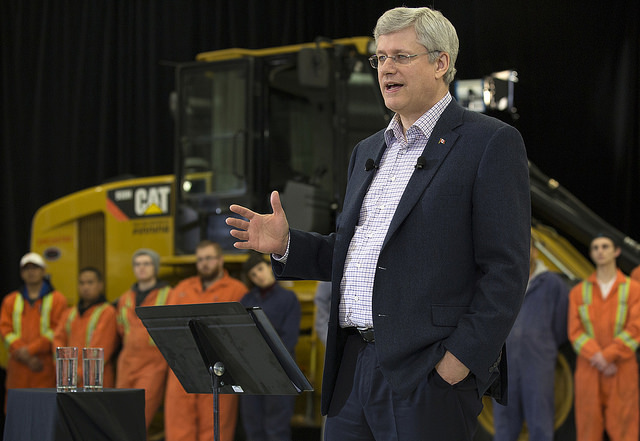The Harper government will be using its $14-billion Building Canada Fund to help it win the October 19 federal election.
The Globe and Mail reports, “The Conservative government is preparing an infrastructure spending spree in the runup to the fall election, as federal and provincial sources confirm work is heating up to announce new projects under the New Building Canada Fund. …The flurry of announcements will represent an attempt by the Conservative Party to bolster its image on the infrastructure file ahead of a campaign that is expected to focus heavily on issues such as traffic congestion and public transit.”
And the newspaper’s chief political writer Campbell Clark comments, “That’s a powerful edge, and it matters more this year than ever before. …With the Oct. 19 election date set by law, all three parties knew they faced a long, three-part campaign that would start with a prepositioning period from late last year till the end of June, and end with a sprint from Labour Day to election day. But there’s two months of summer in the middle. …[Mr. Harper’s Conservatives] can use a summer spree of announcements to send a message to voters while their opponents save their pennies, and struggle to be heard.”
But let’s look more closely at the Building Canada Fund.
In February 2014, the Globe and Mail reported, “[Municipalities] learned that any project worth more than $100-million must be approved by a Crown corporation called P3 Canada, which will make binding decisions on whether the infrastructure must be a public-private partnership.” That’s because Harper believes, “[P3s are] an excellent additional tool to allow taxpayers to share risk and thus help get projects completed on time and on budget. We need to see more private sector innovation and we need to see it better utilized in developing modern infrastructure.”
And yet the Financial Post has reported, “John Loxley, an economics professor at the University of Manitoba, opposes P3s and any expansion of them into the municipal sector. ‘The argument in favour of P3s has been exaggerated,’ he says, noting there hasn’t been any long-term analysis of benefits. He calls the risk calculations ‘highly dubious,’ also believing governments pay too much in interest payments and says P3s cut small, local contractors out of the picture.”
Notably, Infrastructure Canada says, “The priority funding categories for the fund will be Core National Highway System (NHS) Routes, Drinking Water, Wastewater, Public Transit and Green Energy.”
Council of Canadians water campaigner Emma Lui writes, “A study of 28 P3 projects in Ontario worth more than $7-billion found that public-private partnerships cost an average of 16 per cent more than conventional tendered contracts. Allocating funding for water services under P3s entrenches water governance within a market framework that favours profit over human rights, environmental protection, social justice and public health.”
And Council of Canadians chairperson Maude Barlow has warned of the implications that could arise under the Canada-European Union ‘free trade’ agreement. “Cash-strapped municipalities can only access federal funds if they adopt a public-private partnership model, and several cities have recently put their water or wastewater services contracts up for private bids. If Suez or Veolia are successful in bidding for these contracts (under the deal local governments cannot favour local bidders) and a future city council decides it wants to move back to a public system, as municipalities are doing all over the world, these corporations will be able to sue for huge compensation.”
She highlights, “If the right to water is to be honoured, it is crucial to keep municipal water services in public hands and to maintain their status as a public service.”
While Harper will try to use Building Canada Fund announcements this summer to help his government win the October 19 federal election, voters should examine those announcements closely, recognize that they are promoting privatization, and that they could undermine the human right to water.
Photo: pmwebphotos/flickr




